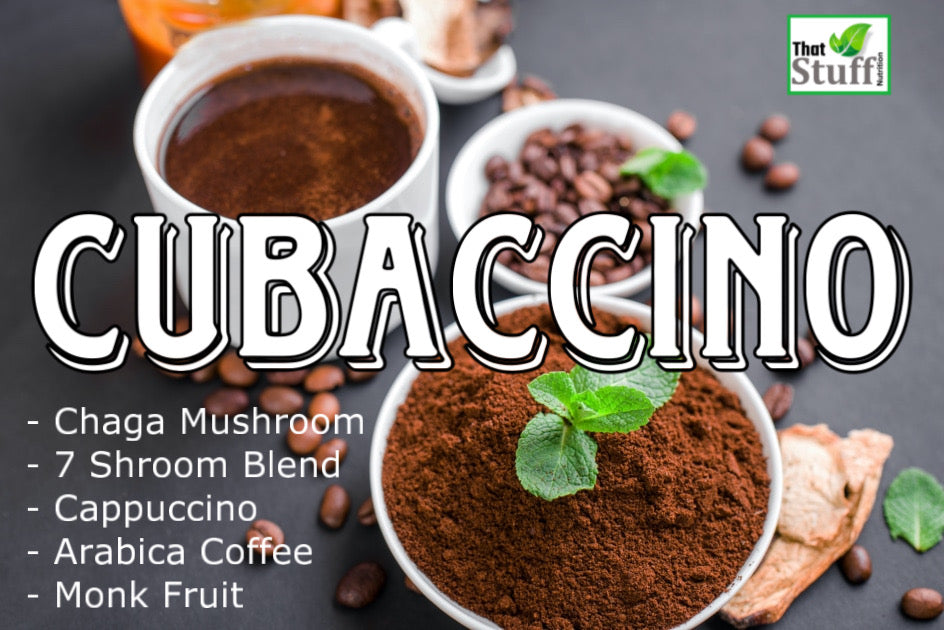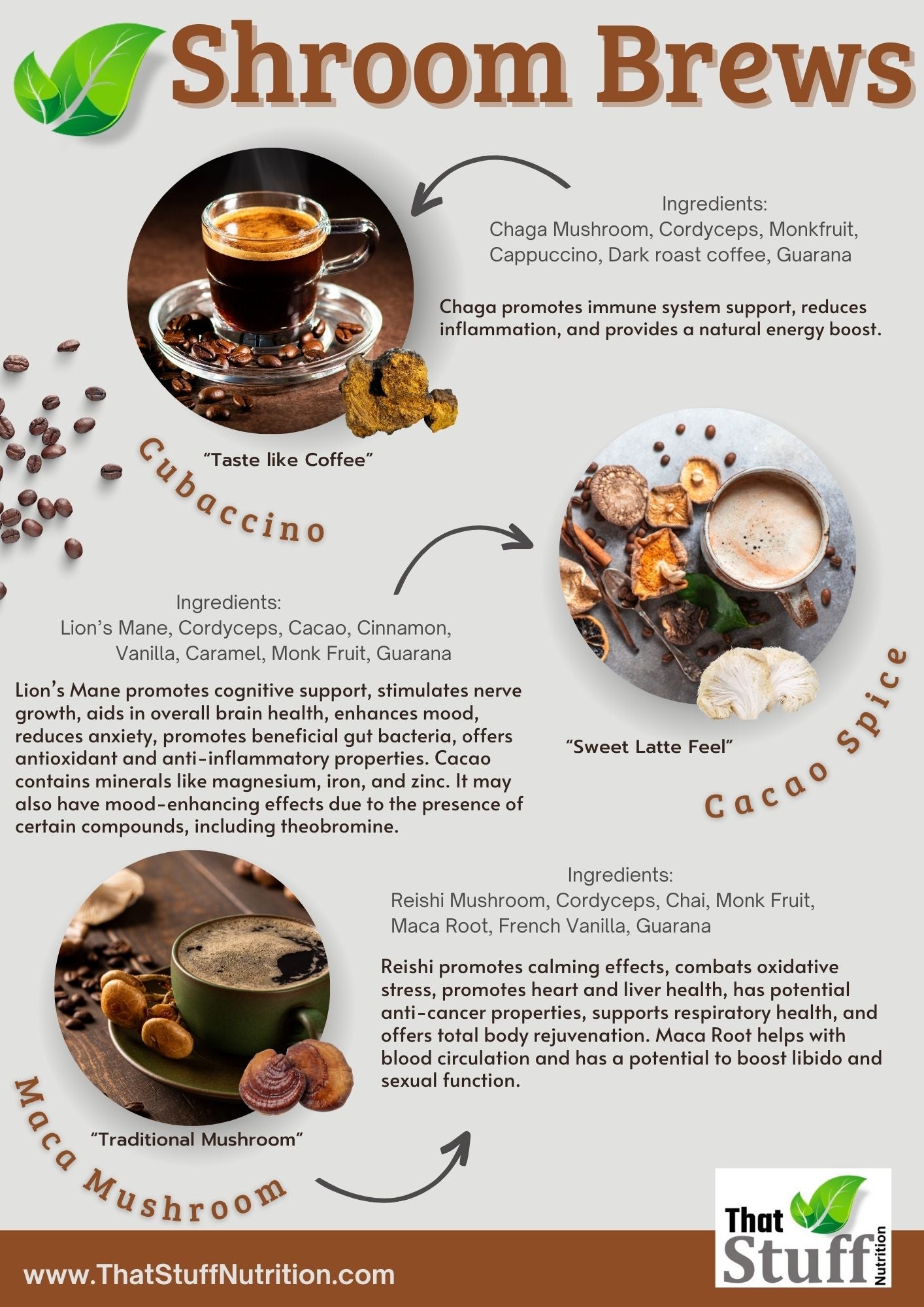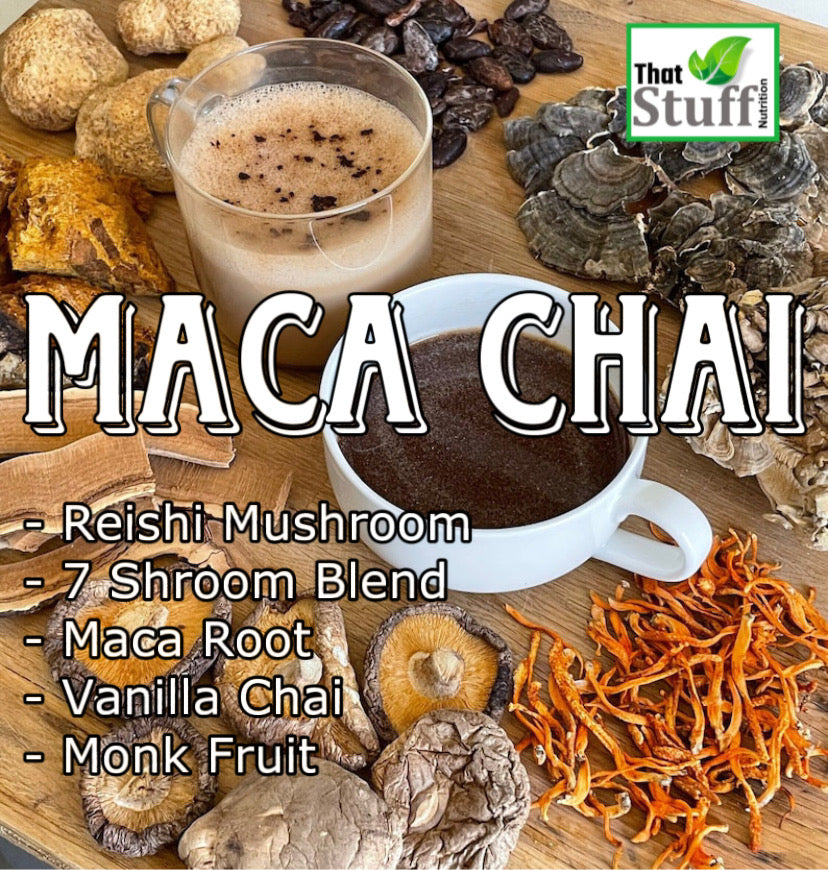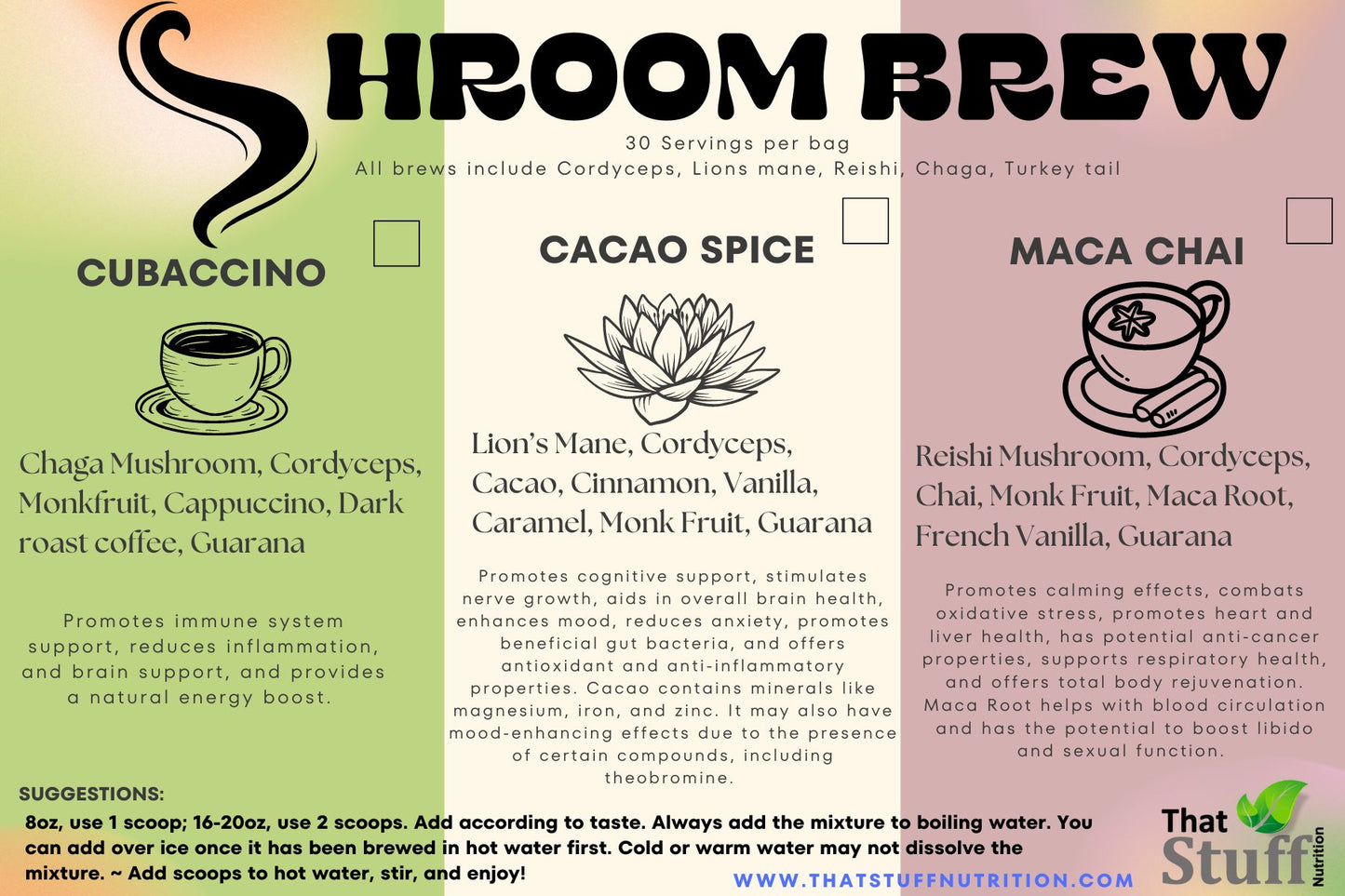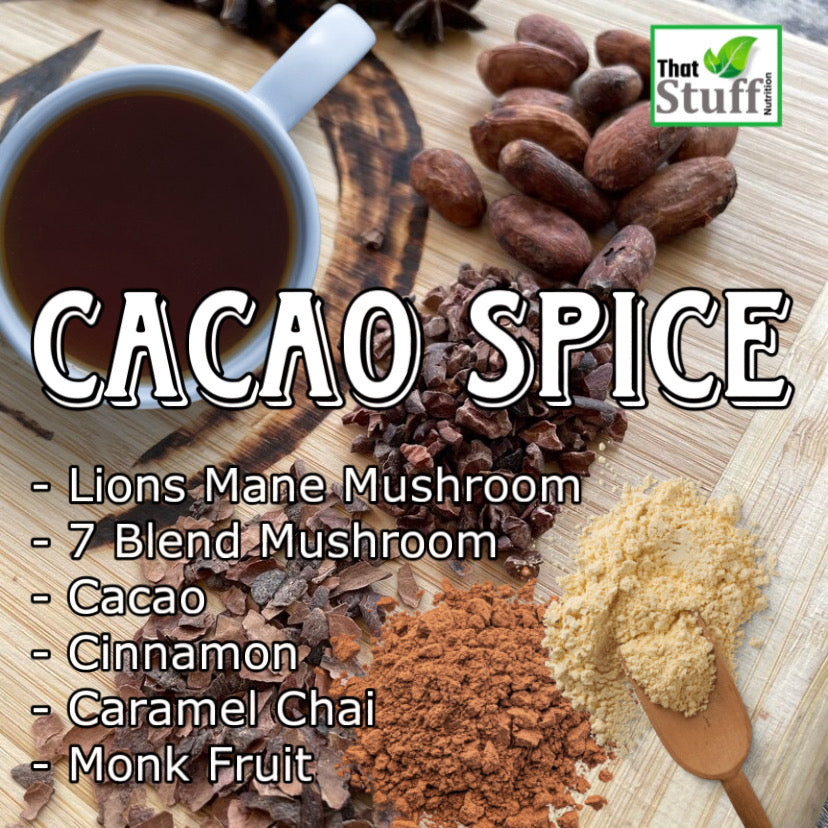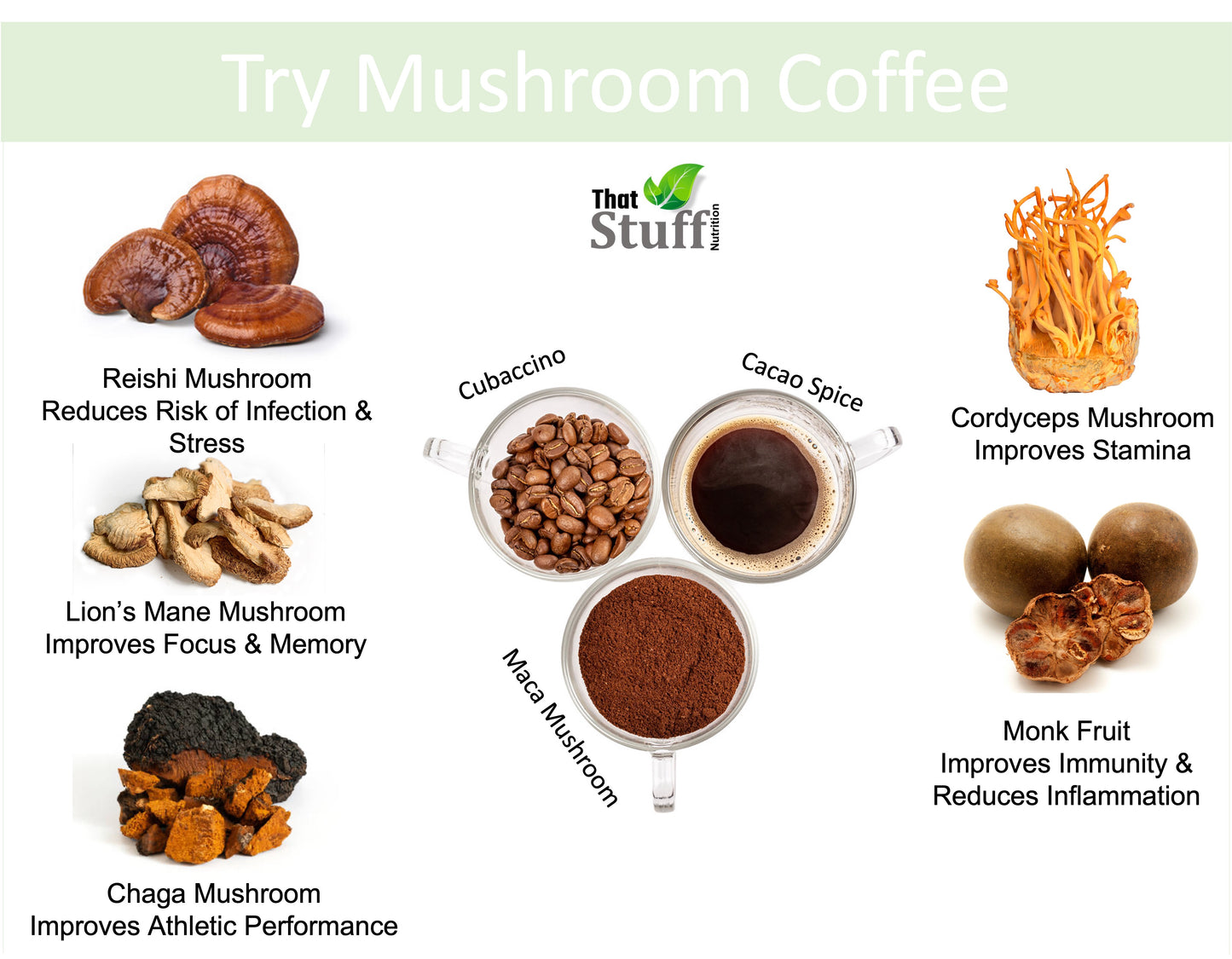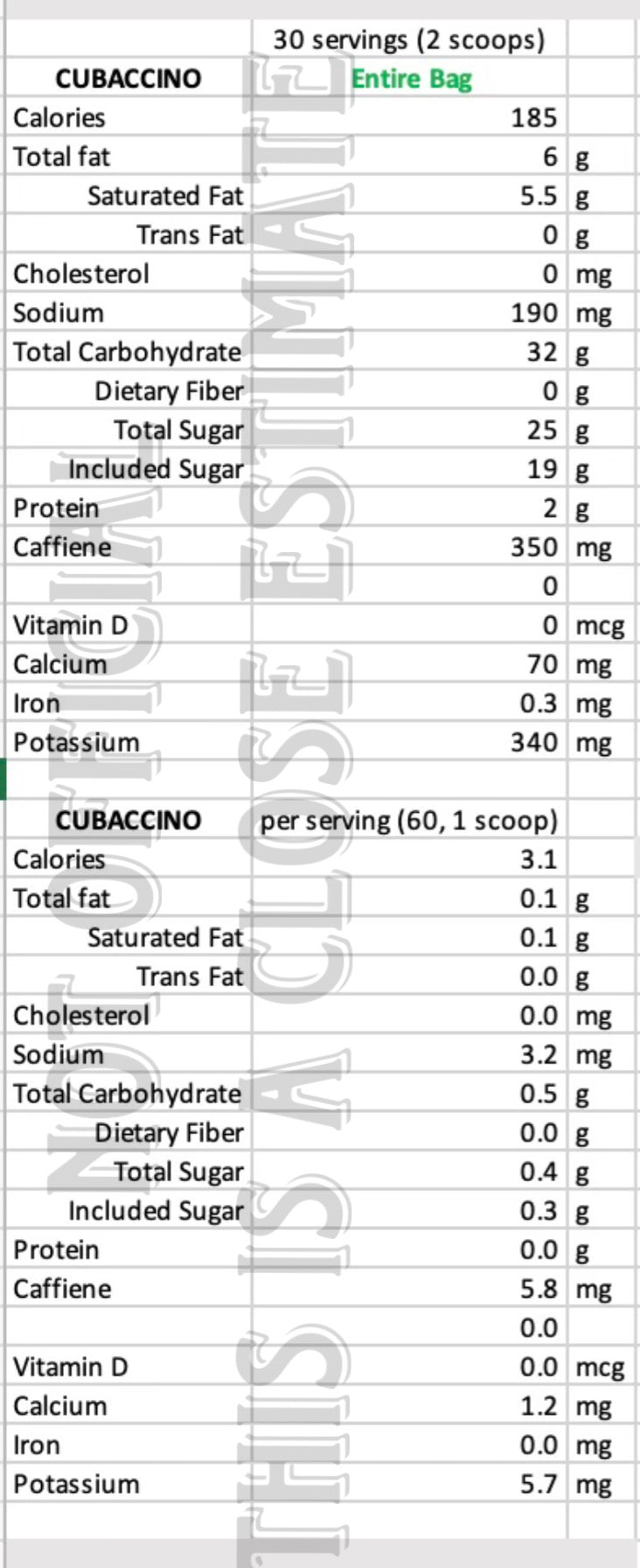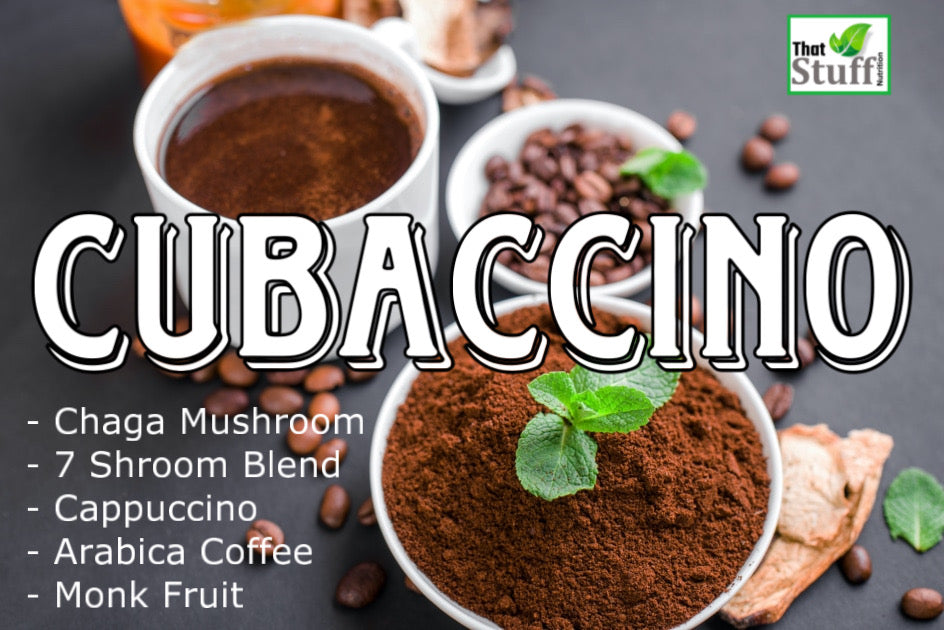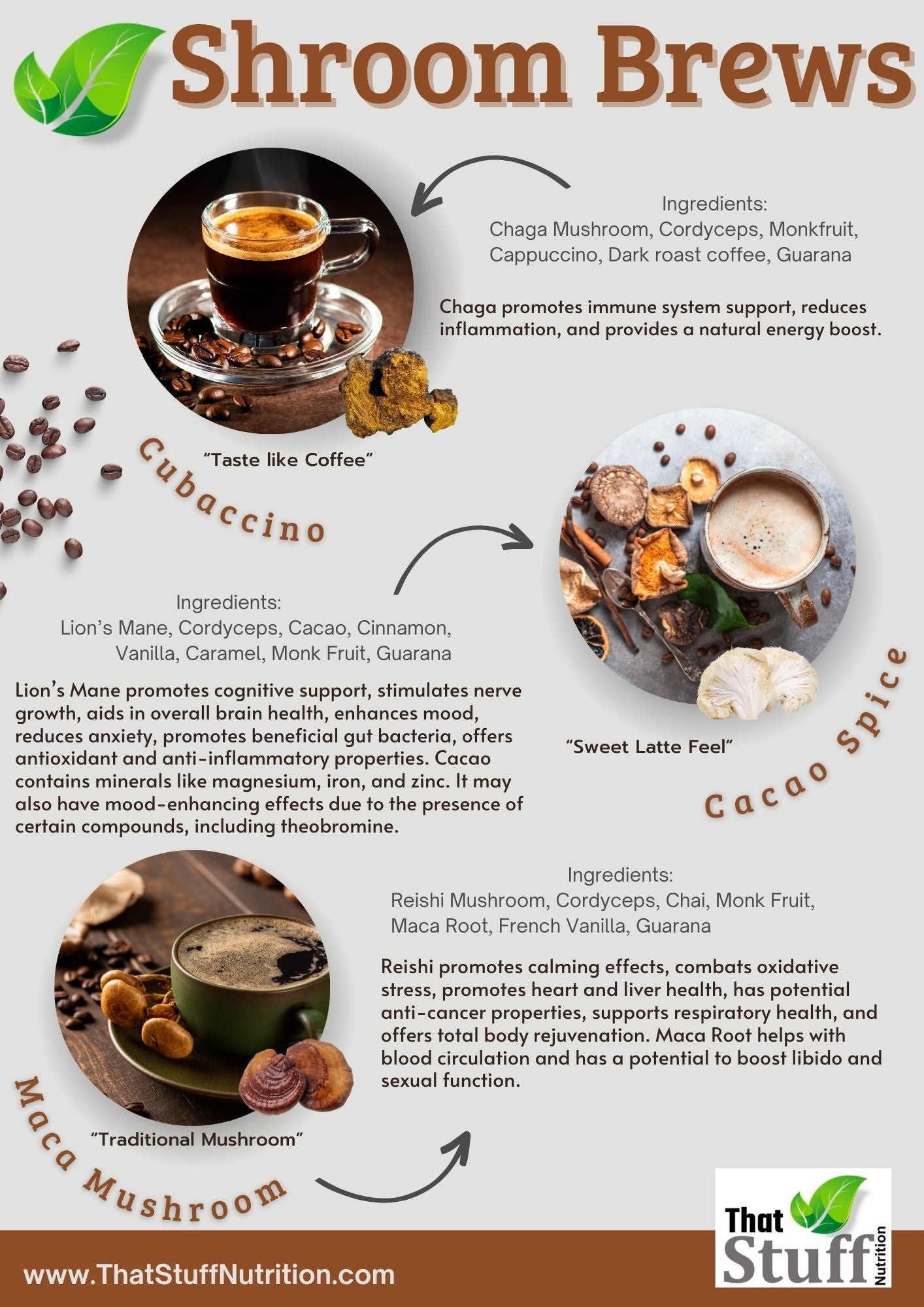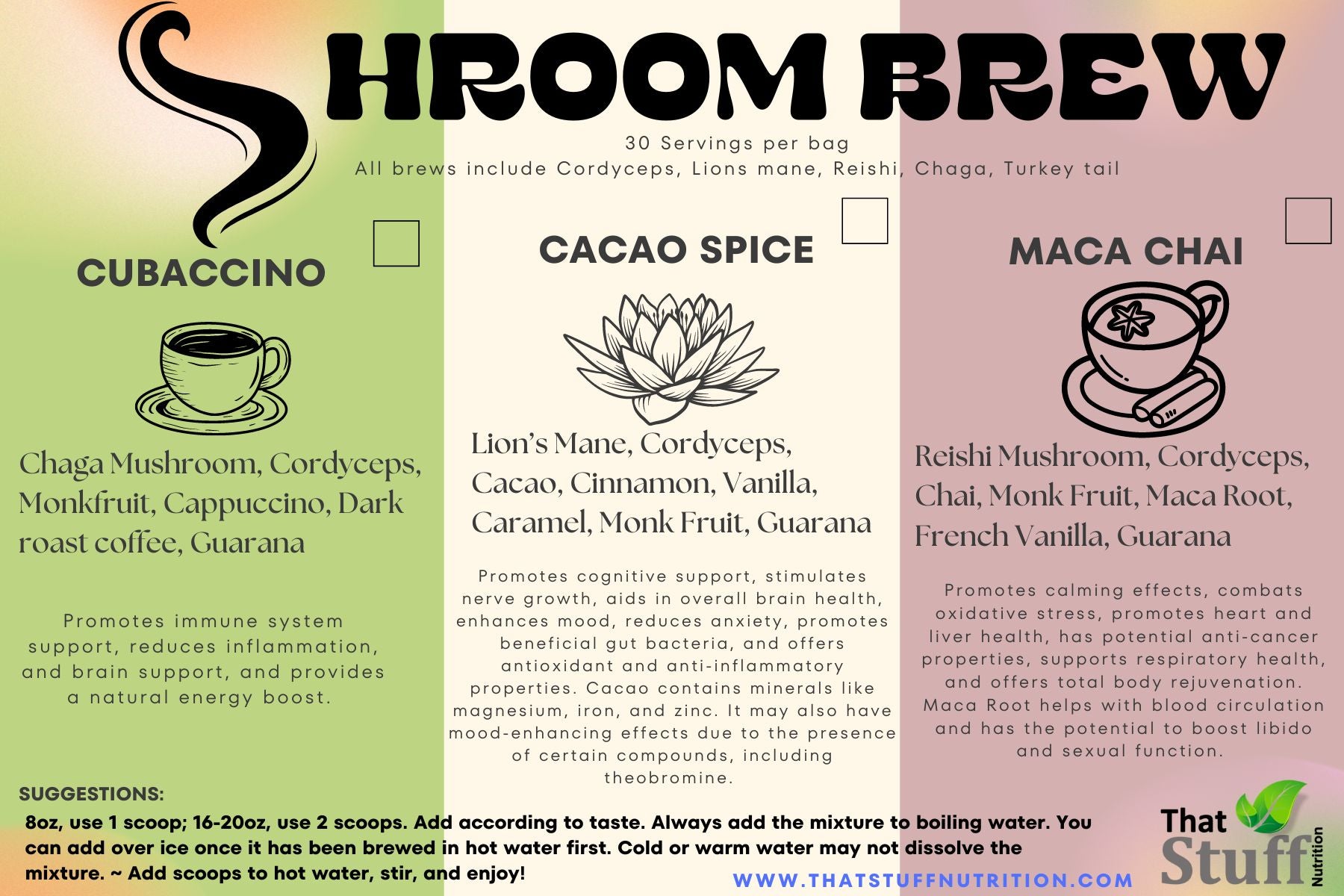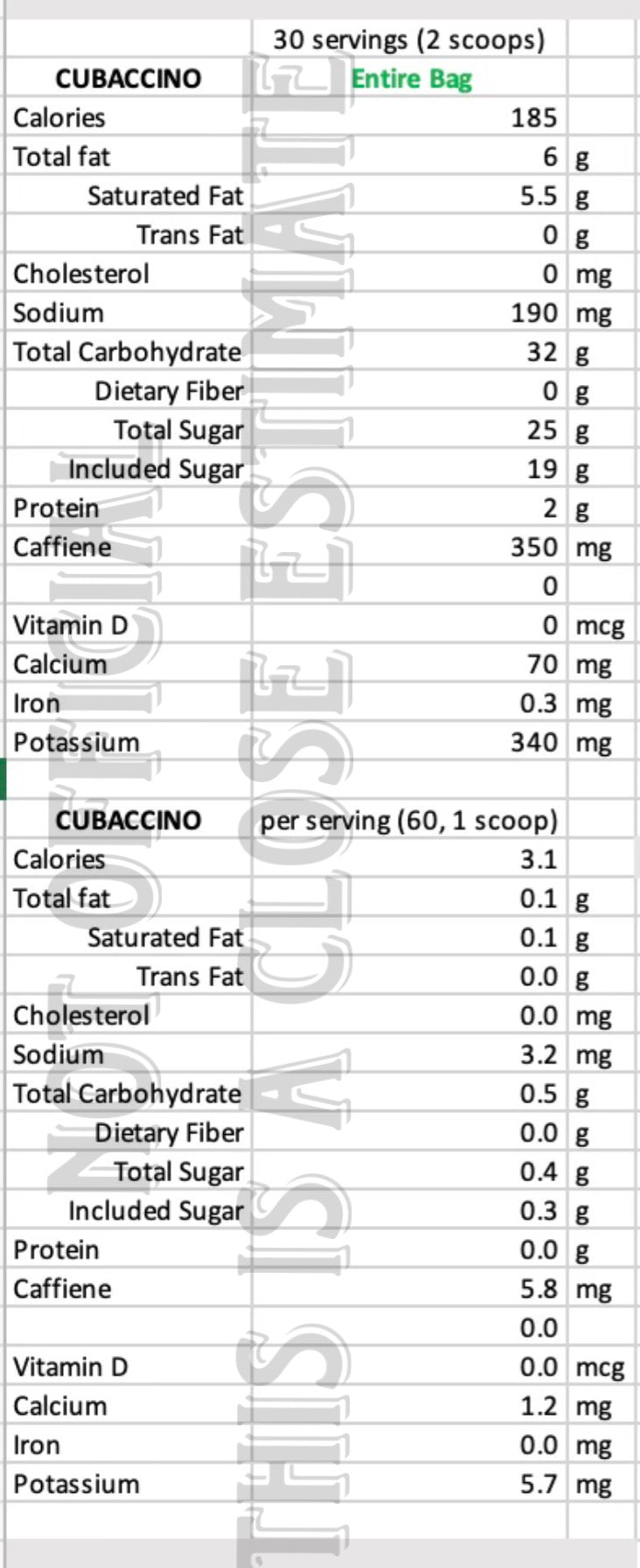Shroom Brew
Shroom Brew
Delve into the rich world of fungi with That Stuff Nutrition's shroom brews, expertly formulated with a diverse array of seven potent mushrooms. Experience the immune-boosting prowess of Reishi, the cognitive enhancement of Lion's Mane, and the adaptogenic benefits of Chaga. Our blends also feature the stamina-boosting Cordyceps, antioxidant-rich Turkey Tail, mood-enhancing Shiitake, and the nutrient-packed Maitake. Each mushroom plays a unique role, contributing to a holistic approach to well-being in every sip of That Stuff Nutrition's shroom brews.
*All include our full spectrum shroom mix of Lions mane, Chaga, Cordyceps, Reishi, Turkey tail, Maitake, Shiitake along with Monk Fruit, Allulose, and Trehalose.*
With our signature 3 your taste buds and your health will be elevated to new heights.
30 serving bags: Grab a full bag of each or enjoy a mixed bag.
🍄 Maca Chai (8–12 oz)
• Estimated Calories:50–100 kcal
🍫 Cacao Spice (8–12 oz)
• Estimated Calories: 60–110 kcal
☕ Cubaccino (8–12 oz)
• Estimated Calories: 35–70 kcal
(Wondering about Our Ingredients? Read towards the bottom)
CUBACCINO: (Chaga) taste like coffee
Higher In: Chaga Mushroom, Cordyceps, Cappuccino, Dark Roast Coffee.
- Chaga may promote immune system support, reduce inflammation, brain support, and provide a natural energy boost.
CACAO SPICE: (Lion's Mane) sweet latte feel
Higher in: Lion’s Mane, Cordyceps, Cacao, Cinnamon, Vanilla, Caramel Chai
- Lion’s Mane has been researched to promote cognitive support, stimulate nerve growth, aids in overall brain health, enhances mood, reduces anxiety, promotes beneficial gut bacteria, offers antioxidant and anti-inflammatory properties. Cacao contains minerals like magnesium, iron, and zinc. It may also have mood-enhancing effects due to the presence of certain compounds, including theobromine. Madagascar vanilla beans contains antioxidants that may help protect your cells from damage. Additionally, it has been associated with potential mood-lifting effects and may have mild calming properties. However, it’s essential to note that these benefits are mostly linked to the compounds found in vanilla. Cinnamon contains antioxidants that may help fight inflammation and protect cells from damage. It has been linked to improved insulin sensitivity, which could be beneficial for managing blood sugar levels. Some studies suggest it may have anti-inflammatory and antimicrobial properties
MACA CHAI: (Reishi) earthy and sweet nutty taste
Higher in: Reishi Mushroom, Cordyceps, Chai, Maca Root, French Vanilla
-
Reishi has been researched to promote calming effects, combat oxidative stress, promotes heart and liver health, has potential anti-cancer properties, supports respiratory health, and offers total body rejuvenation. Maca Root may help with blood circulation and has a potential to boost libido and sexual function.
Shelf life is 18-months if stored properly however the flavor may fade after a few months so it is encouraged you use within 2 months.
For those that love the science: ;-)
CHAGA SCIENCE
Antioxidant Potential: Chaga Mushroom, scientifically known as Inonotus obliquus, exhibits a rich profile of bioactive compounds, including polyphenols and triterpenes, conferring potent antioxidant properties. These compounds scavenge free radicals, reducing oxidative stress and mitigating cellular damage.
Immunomodulatory Activity: Research suggests that Chaga may modulate immune system responses through its interaction with immune cells. Components like beta-glucans contribute to immunomodulation, potentially enhancing the body's defense mechanisms against pathogens.
Anti-Inflammatory Effects: Chaga's triterpene compounds, such as betulinic acid, have been linked to anti-inflammatory effects by inhibiting pro-inflammatory cytokines. This may contribute to the alleviation of chronic inflammation, a factor associated with various health issues.
Adaptogenic Properties: Chaga demonstrates adaptogenic characteristics, supporting the body's ability to adapt and resist stressors. This adaptogenic potential may contribute to improved resilience and homeostasis in the face of physiological challenges.
Antimicrobial Activity: Chaga exhibits antimicrobial properties, potentially inhibiting the growth of certain bacteria and fungi. This property adds to its traditional use as a natural remedy for combating infections.
Skin Health Benefits: Compounds found in Chaga may promote skin health by contributing to collagen formation and protecting against oxidative stress, offering potential benefits for dermatological conditions and overall skin appearance.
Energy Metabolism Support: Chaga's bioactive constituents may play a role in supporting energy metabolism, potentially enhancing cellular energy production and contributing to a sustained, natural energy boost.
These scientific insights highlight Chaga Mushroom's multifaceted impact on the body, encompassing antioxidant, anti-inflammatory, immunomodulatory, and adaptogenic effects.
LION'S MANE SCIENCE
Lion's Mane Mushroom (Hericium erinaceus) has gained attention for its potential health benefits, supported by scientific research. Here are some of the key scientifically studied benefits:
Cognitive Health: Lion's Mane contains compounds, such as hericenones and erinacines, that may stimulate the production of nerve growth factor (NGF). NGF plays a crucial role in the growth, maintenance, and survival of neurons, suggesting potential benefits for cognitive function and neuroprotection.
Neuroprotection: Studies indicate that Lion's Mane Mushroom exhibits neuroprotective properties, shielding the brain and nervous system from oxidative stress and inflammation. This suggests potential applications in preventing or mitigating neurodegenerative conditions.
Mood and Anxiety Support: Research has explored Lion's Mane's potential effects on mood and anxiety. Its ability to modulate neurotransmitters may contribute to its mood-enhancing and anxiolytic (anxiety-reducing) effects.
Digestive Health: Lion's Mane has been studied for its positive impact on the digestive system. It may promote the growth of beneficial gut bacteria, supporting a healthy gut microbiota and potentially benefiting digestion.
Anti-Inflammatory Effects: Compounds found in Lion's Mane, including polysaccharides, have demonstrated anti-inflammatory properties. This suggests a potential role in reducing inflammation, which is associated with various chronic diseases.
Immune System Modulation: Lion's Mane may modulate the immune system, enhancing the activity of certain immune cells. This immune-boosting potential could contribute to overall health and resistance to infections.
Antioxidant Activity: Lion's Mane is rich in antioxidants, which help neutralize free radicals and reduce oxidative stress. This antioxidant activity may have broad implications for preventing cellular damage and supporting overall well-being.
Energy Metabolism Support: Some research suggests that Lion's Mane may play a role in supporting energy metabolism. This could contribute to increased energy levels and overall vitality.
These scientific findings highlight the potential of Lion's Mane Mushroom as a natural supplement with diverse health benefits, particularly in the realms of cognitive health, neuroprotection, and mood regulation. As with any supplement, it's important to consult with a healthcare professional before incorporating Lion's Mane into your routine, especially if you have pre-existing health conditions or are taking medications.
REISHI SCIENCE
Reishi Mushroom, scientifically known as Ganoderma lucidum, offers a range of potential health benefits. Here's a straightforward breakdown:
Stress Reduction: Reishi is often linked to stress reduction and relaxation. It contains compounds that may help regulate the body's response to stress, promoting a sense of calm.
Immune System Support: Known for its immune-boosting properties, Reishi may enhance the activity of certain immune cells, contributing to better overall immune function.
Anti-Inflammatory Effects: Reishi contains compounds with anti-inflammatory properties that may help reduce inflammation in the body. This could be beneficial for conditions related to chronic inflammation.
Improved Sleep: Some studies suggest that Reishi may have a positive impact on sleep patterns, helping individuals achieve better sleep quality.
Antioxidant Power: Rich in antioxidants, Reishi helps combat oxidative stress and neutralize free radicals, potentially reducing the risk of chronic diseases.
Heart Health: Reishi has been linked to cardiovascular health benefits, including the potential to lower blood pressure and improve cholesterol levels.
Liver Support: Research indicates that Reishi may have protective effects on the liver, promoting liver health and aiding in detoxification processes.
Anti-Cancer Properties: While more research is needed, some studies suggest that Reishi may have anti-cancer properties, inhibiting the growth of certain types of cancer cells.
Respiratory Health: Reishi has been traditionally used to support respiratory health, and some studies suggest it may have potential benefits for conditions like asthma and bronchitis.
Adaptogenic Qualities: Reishi is considered an adaptogen, helping the body adapt to stressors and maintain balance. This adaptogenic nature contributes to overall well-being.
TREHALOSE SCIENCE
Trehalose, a non-reducing disaccharide ubiquitous in nature and found in organisms ranging from microorganisms to higher plants, has garnered increasing attention for its unique biochemical properties and potential implications in the field of sports nutrition.
Composition and Sources:
Trehalose, chemically identified as α-D-glucopyranosyl-(1,1)-α-D-glucopyranoside, is naturally synthesized in various organisms through enzymatic pathways. Common sources include fungi, yeast, and certain plant species. Its structural attributes contribute to its distinct physiological behavior.
Metabolic Mechanisms:
Unlike conventional carbohydrates, trehalose's metabolic fate involves gradual enzymatic hydrolysis, leading to a controlled release of glucose. This unique feature establishes trehalose as a potential modulator of energy metabolism, prompting a sustained and balanced provision of energy substrates to the exercising musculature.
Physiological Implications for Athletes:
-
Sustained Energy Metabolism: Trehalose's distinctive catabolic pathway results in a prolonged release of glucose into the bloodstream. This sustained energy provision has the potential to mitigate the rapid fluctuations in blood glucose levels associated with traditional carbohydrate sources, offering a more stable substrate for energy metabolism during prolonged exercise.
-
Endurance Enhancement: The controlled and protracted supply of energy from trehalose may contribute to improved endurance during aerobic activities. By mitigating the deleterious effects of energy depletion, trehalose has the potential to extend the time to fatigue, thereby enhancing overall endurance performance.
-
Mitigation of Cellular Fatigue: Beyond its role as a metabolic substrate, trehalose has been implicated in cellular protection mechanisms. Studies suggest that trehalose's presence may confer resilience to cellular structures, potentially mitigating the onset of fatigue at the cellular level and contributing to sustained athletic performance.
-
Reduction of Oxidative Stress Impact: Trehalose's structural attributes position it as a potential mitigator of oxidative stress. Its ability to stabilize cellular components may reduce the impact of reactive oxygen species generated during intense exercise, thereby aiding in post-exertional recovery.
Simply put….Trehalose is a disaccharide sugar that has been studied for its many potential benefits, including antioxidant properties and its ability to protect cells from various stresses. Some research suggests it may have applications in neuroprotection, cardiovascular health, and as a stabilizing agent in certain medical formulations.
Ultimately beneficial for
1. Energy Source
2. Osmoprotectant Properties
3. Antioxidant Effects
4. Cellular Health Support
MONK FRUIT SCIENCE
Monk fruit (Siraitia grosvenorii) has gained prominence as a natural sweetening agent, primarily attributed to its intense sweetness derived from mogrosides.
Biochemical Composition:
Monk fruit's sweetness is primarily attributed to a group of cucurbitane-type triterpene glycosides known as mogrosides. Among these, mogroside V is the most prevalent and recognized for its potent sweetness. Additionally, monk fruit contains flavonoids, polysaccharides, and other bioactive compounds that contribute to its nutritional profile.
Metabolic Impact:
-
Non-Nutritive Sweetener: Monk fruit's sweetness, predominantly mediated by mogrosides, classifies it as a non-nutritive sweetener. The unique aspect of monk fruit lies in its intense sweetness without a concurrent increase in caloric content, making it a potential alternative for individuals, including athletes, seeking reduced-calorie sweetening options.
-
Antioxidant Properties: Flavonoids present in monk fruit exhibit antioxidant properties, suggesting a role in mitigating oxidative stress. In the context of athletic performance, the potential reduction in oxidative stress may contribute to enhanced recovery and improved exercise adaptation.
-
Impact on Glycemic Response: Monk fruit's sweetness is derived without a significant increase in glucose, suggesting a minimal impact on glycemic response. This property could be advantageous for athletes managing blood glucose levels and seeking alternatives to traditional sweeteners with potential metabolic implications.
Physiological Implications for Athletes:
-
Caloric Control in Nutrition Plans: Monk fruit's non-nutritive sweetening capability provides athletes with a tool for caloric control in their nutrition plans. Incorporating monk fruit as a sweetening agent may facilitate adherence to calorie-restricted diets without sacrificing taste.
-
Antioxidant-Mediated Performance Enhancement: The antioxidant properties of monk fruit may contribute to reducing exercise-induced oxidative stress. This aspect could potentially enhance athletic performance by minimizing the impact of reactive oxygen species on cellular structures.
-
Glycemic Management: Athletes managing glycemic response may find monk fruit advantageous in maintaining sweetness without a concomitant rise in blood glucose levels. This property aligns with the growing interest in alternative sweeteners for athletes with specific metabolic considerations.
***Combining trehalose with monk fruit provides potential benefits, as monk fruit is a zero-calorie sweetener, and trehalose offers unique properties like being an energy source and an osmoprotectant. Together, they offer a sweetening solution with a potentially lower impact on blood sugar. ***
ALLULOSE
Allulose, a low-calorie sweetener, has been studied for its potential benefits in athletic performance due to its unique properties. Some potential mechanisms include its ability to enhance glycogen synthesis, improve endurance, and regulate blood sugar levels during exercise. Additionally, allulose may have anti-inflammatory effects, which could aid in recovery post-exercise. However, more research is needed to fully understand the extent of its effects on athletic performance.
Allulose can be beneficial for those following a ketogenic diet due to its low calorie and low glycemic index properties. As a low-calorie sweetener, it can provide sweetness without significantly impacting blood sugar levels or insulin response, making it suitable for people aiming to maintain ketosis. Additionally, some studies suggest that allulose may have minimal impact on ketone levels, allowing individuals to enjoy sweet treats without jeopardizing their ketogenic state. However, it's essential to consume allulose in moderation, as excessive intake may still affect ketosis for some individuals.
WHY OUR BLEND?
Blending allulose, monk fruit, and trehalose together as a sweetener offers several benefits:Enhanced sweetness:
Combining these sweeteners can create a synergistic effect, resulting in a sweeter taste profile than using each sweetener individually. This allows for a reduction in the overall amount of sweetener needed to achieve the desired sweetness level.
Balanced flavor: Each sweetener contributes unique flavor characteristics, and blending them can help balance out any potential aftertastes or flavor inconsistencies, resulting in a more pleasing taste experience.
Lower glycemic impact: Allulose and monk fruit are low-glycemic sweeteners, meaning they have minimal impact on blood sugar levels. Trehalose, although it has a moderate glycemic index, is digested slowly, resulting in a more gradual increase in blood glucose levels compared to other sugars.
Blending these sweeteners can help minimize the glycemic impact of the overall sweetener blend.
Overall, blending allulose, monk fruit, and trehalose as a sweetener offers a balanced, low-glycemic alternative to sugar providing sweetness, flavor, and functional benefits.
GUARANA SCIENCE
Guarana (Paullinia cupana) is a climbing plant native to the Amazon basin, and its seeds have been used for centuries by indigenous tribes for their stimulating properties. Today, guarana is a popular ingredient in energy drinks, supplements, and herbal preparations due to its rich content of caffeine and other bioactive compounds. This ingredient is 22% higher in caffeine and encouarged to use at your own discretion. WE also do not recommend that you add this to the Cubaccino as there is already Coffee in this blend.
Chemical Composition:
The key bioactive component in guarana is caffeine, which is present in higher concentrations compared to other natural sources like coffee beans. In addition to caffeine, guarana contains theobromine, theophylline, tannins, and saponins. The unique matrix of these compounds contributes to the stimulating effects of guarana.
Mechanism of Action:
Caffeine, as the primary active compound in guarana, exerts its effects by blocking adenosine receptors in the central nervous system. This leads to increased alertness, improved mood, and heightened cognitive function. The synergistic interplay of caffeine with other constituents in guarana may modulate the release of neurotransmitters, enhancing its stimulating effects.
Potential Benefits:
-
Cognitive Enhancement: Guarana's caffeine content may contribute to improved cognitive performance, including enhanced alertness, concentration, and short-term memory.
-
Physical Endurance: The stimulant properties of guarana can also translate to increased physical endurance, making it a popular choice among athletes and fitness enthusiasts.
-
Weight Management: Some studies suggest that the thermogenic properties of guarana, attributed to its caffeine content, may aid in weight management by increasing metabolic rate and promoting fat oxidation.
Warnings and Contraindications:
While guarana can offer benefits in certain contexts, it is crucial to be aware of potential risks and contraindications. Here are important warnings on when not to use guarana and who should avoid it:
-
Caffeine Sensitivity: Individuals who are sensitive to caffeine or have a history of adverse reactions to stimulants should exercise caution when using guarana. Excessive consumption may lead to symptoms such as jitteriness, anxiety, and insomnia.
-
Cardiovascular Conditions: Those with pre-existing cardiovascular conditions, such as hypertension or arrhythmias, should consult with a healthcare professional before using guarana. The stimulant properties can affect heart rate and blood pressure.
-
Pregnancy and Breastfeeding: Pregnant and breastfeeding individuals should avoid guarana due to its caffeine content. High caffeine intake during pregnancy has been associated with adverse outcomes.
-
Children: Guarana is not recommended for children due to their lower tolerance for caffeine and the potential for adverse effects on developing nervous systems.
-
Medication Interactions: Guarana may interact with certain medications, including anticoagulants, antiplatelet drugs, and some psychiatric medications. Consultation with a healthcare provider is essential for those taking medications.
While guarana can offer cognitive and physical benefits for some individuals, its use should be approached with caution, especially by those with specific health conditions or sensitivities.
As with any product, it is advisable to seek guidance from a healthcare professional before incorporating sny of our products into one's routine, ensuring safe and informed usage.
Address
Address
10315 W Airport Blvd Ste 8 Stafford, TX 77477
Cancellations/Refunds
Cancellations/Refunds
There are no Refunds given, you may transfer once to a new time slot but this must be determined within 8hrs of your original time slot.
Appointment Tips
Appointment Tips
- Set clear goals
- Bring relevant health details
- Track current habits
- List specific questions
- Have a notebook or device for notes
- Be ready to discuss challenges
- Come with an open mind
- Arrive on time
(if applicable)
- Wear workout gear
- Bring a water bottle
Share
